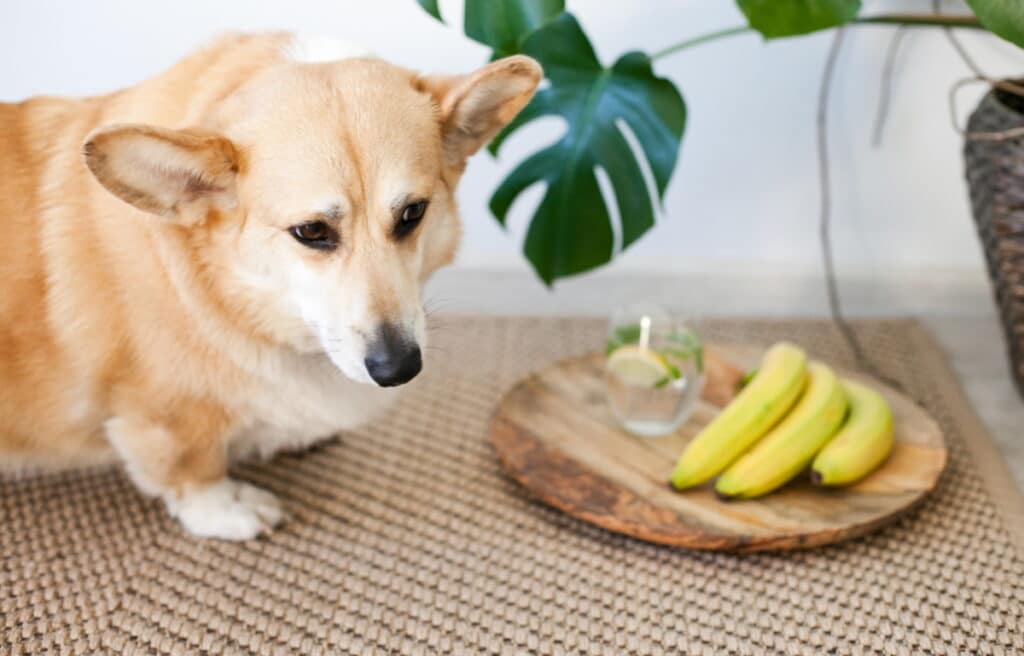Key Takeaways:
- Monstera is highly irritating to your dog’s mouth.
- The most common clinical sign that your pet has eaten Monstera is drooling and oral pain.
- Monstera plants contain oxalates that can be toxic to pets’ kidneys.
You’ve just come home from work to dirt everywhere, your prized Monstera plant in shreds all over the hall rug, and a rather sheepish-looking pooch with tell tale soil on their snoot. Suddenly you wonder if they’ve eaten some and if it’s toxic to our furbabies. Well, you’re in the right place. Read on to learn more about Monstera plants and the dangers they can pose to our canine counterparts if eaten.
From the Araceae family, Monstera is also known as the Swiss cheese plant due to its characteristic leaf shape. Though it is a beautiful plant, it can be harmful to our fur babies if eaten. The plant contains a high concentration of oxalates which are potent irritants. In this article, we’ll give you all the information about the Monstera plant you need to keep your pooch safe.
How much Monstera plant is toxic to dogs?
Due to the high concentration of oxalates in the Monstera plant, it’s quite irritant to our pets (and children) if ingested. Luckily, eating some Monstera plant is rarely fatal, and most pets only eat a small amount as it tastes quite bitter and can start to irritate the mouth quite quickly after ingestion. In fact, Monstera has also known as a “dumb cane,” and there’s a small possibility that your pet may lose their voice after eating the plant.
There’s no established “toxic dose” of Monstera plant, but just a small amount is quite irritant. If your pooch manages to eat a larger amount or they’re a very small dog, there is a risk that the Monstera plant could cause kidney damage and rarely death.
What to do if my dog ate the Monstera plant?
As the Monstera plant is highly irritant to the oral mucosa, your pet may whine, yelp or paw at their face to indicate that something is wrong. You may also notice your pet drooling in response to the burning sensation they’re feeling. While there’s no established “toxic dose,” you should contact your veterinarian if your pet is showing any signs of discomfort. Don’t forget to bring some of the plant or a photo to show your veterinarian so that they can establish exactly what’s causing your pet’s signs.
If your dog is a medium/large breed and only took a small bite of the plant without showing signs, you can just monitor for a day or two. However, if your dog is a small breed or ate a large amount, then you should make an appointment with your veterinarian as soon as possible. Signs of Monstera ingestion are generally fairly immediate but can take up to 2 hours to appear.
If your pooch ate a tiny amount and is showing no signs, then you can just monitor for a day or two. If, however, your Great Dane ate a whole leaf or your pooch is a Chihuahua, then you should contact your veterinarian for an emergency appointment, even if they’re not showing any obvious signs yet.
What to do Immediately If You Suspect Your Dog Has Been Poisoned by a Monstera plant.
The first thing to do is to figure out how much your pet has eaten. Rinse your dog’s mouth with copious amounts of water, taking care not to squirt it into the back of their mouth where it may be aspirated into the lungs.
Monitor your dog to see if they start showing signs of oral irritation, which include pawing at their face, drooling, and whimpering. You can also carefully check if your pet’s gums and inner lips are reddened or swollen. If you see any of these changes or your dog is having breathing difficulties, then you should contact your DVM for an immediate appointment.
If your dog isn’t showing any signs and they only ate a tiny amount of Monstera plant, then they will likely be fine, but there’s no harm in having them checked over in the coming days. Dogs that have eaten larger amounts of Monstera (this will depend on how large they are themselves) should definitely be assessed by your veterinarian as soon as possible. This should be done whether they have clinical signs of irritation or a tummy upset, as the oxalates in Monstera plants can affect your pooch’s urinary system.
The bottom line is if your pup eats some Monstera plant, then you should contact your DVM for an appointment as soon as possible. If your pet is showing any signs of irritation or gastrointestinal distress, then an emergency appointment should be the focus.
What if my dog ate plenty of Monstera but seems fine?
Due to its highly irritant properties, pooches that have eaten the Monstera plant invariably show signs of pain in their mouth or gastrointestinal issues such as vomiting or even diarrhea. In the event that your fur baby isn’t showing any signs but seems to have eaten quite a bit of Monstera, then you should contact your veterinarian for an appointment as soon as possible.
If your pooch ate Monstera within a couple of hours, then your veterinarian may decide to induce vomiting though this can increase the risk of oral and mucosal irritation from the plant releasing oxalates and the delicate mucosa of the esophagus being exposed during the period of vomiting.
Just because your pet isn’t showing any signs of poisoning immediately doesn’t mean that they don’t need a veterinarian. This is because more serious internal problems, such as kidney damage, could be occurring silently.
Signs that my dog got Monstera poisoning
Clinical signs of Monstera poisoning are fairly typical for many types of poisoning, including an upset tummy. Check out the list below of what to watch out for if your pet has eaten some Monstera plant.
- Excessive drooling
- Pawing at the face due to an intense burning sensation in the mouth
- Difficulty swallowing or even choking due to swollen throat or tongue
- Difficulty breathing
- Vomiting
- Diarrhea
Severe cases may develop convulsions, renal failure, and even death though luckily, this is very rare. The most common signs of Monstera poisoning are excessive drooling, tummy upsets, and pawing at their face due to pain.
What happens to dogs that eat Monstera?
The calcium oxalate crystals within the cells of the Swiss Cheese plant are very damaging to the delicate tissues of the mouth and throat. Causing intense burning sensations, the resulting inflammation leads to swelling that can interfere with swallowing and breathing.
Large enough quantities can be fatal, though this is rare as the bitter taste generally discourages pooches from eating much of the plant. Permanent liver and/or kidney failure is possible, however, even with small amounts in some pets.
Though toxic, Monstera is rarely fatal, but it can cause permanent organ damage in some cases. This is part of why it’s so important that your veterinarian examines your pooch after eating some Swiss Cheese plant.
Why Monstera is toxic to dogs?
Monstera contains calcium oxalate crystals in its cells which are released when chewed. These oxalates are severe irritants and also affect your pooch’s kidneys by forming urinary stones and could even lead to kidney failure. This is particularly risky if your pup already has kidney damage. You should ensure your fur baby has a veterinary check over as soon as possible after eating some Monstera.
Swiss cheese plant contains calcium oxalate crystals. These crystals are released when the cells are broken as your pet chews on the plant. As well as causing almost immediate irritation to your pooch’s delicate oral mucosa, the crystals can accumulate in the kidneys, causing the development of urinary stones and even kidney failure.
How do vets treat Monstera poisoning?
The first thing your veterinarian will do is ask to see the plant. It’s important to bring some of the plant your pet has eaten if you’re unsure what they’ve eaten. This allows your vet to determine the toxic properties of the plant to which your pet has been exposed.
Your veterinarian will also ask some questions, including:
- How long ago did your pet eat the plant, or how long were they left unsupervised and could’ve eaten the plant?
- Is your pet showing any clinical signs, such as pawing at their face or drooling?
- How much did your pooch eat?
These questions help your dog determine the best course of action. Inducing vomiting exposes your dog’s esophagus and mouth to the oxalate crystals, so your veterinarian won’t do this if your pet is showing signs of irritation of their oral mucosa or has any swelling of the tongue or mouth.
They will administer anti-inflammatory medications to reduce swelling and may place your pet on oxygen to help their breathing. Your dog will also be started on gastro-protectant medication such as sucralfate to soothe the pain and irritation of their esophageal and stomach linings.
Depending on how much of the Swiss cheese plant your pet has eaten, your DVM will perform bloodwork to establish a baseline for kidney function before starting IV fluid therapy to flush through your fur baby’s kidneys and urinary system.
Flushing through the kidneys and bladder will help your pet excrete the calcium oxalate crystals and prevent them from combining to form bladder or kidney stones. Urinary stones, once established, can require surgery to remove. Luckily kidney failure is rare and usually happens in dog’s that already have kidney disease, so your veterinarian will likely need serial bloodwork in these patients to assess your pet’s kidney function in the coming days.
Most cases of Monstera ingestion can be treated on an outpatient or short-term hospital admissions basis. The important aspects of treatment are flushing the kidneys with fluid therapy to remove the calcium oxalate crystals and also administering anti-inflammatory and gastro-protectant medications to treat the clinical signs of irritation.
Final Woof
Monstera plants contain calcium oxalate crystals within their cells. These crystals are rarely systemically toxic but do cause severe irritation of your pup’s delicate mouth, esophageal and stomach linings.
The most common signs of Monstera poisoning include drooling, pawing and scratching at the face, and an upset tummy. Sometimes the irritation can lead to excessive swelling that leads to your pet having difficulty breathing and needing immediate veterinary treatment.
The calcium oxalate crystals released by the Monstera cells, when chewed, accumulate in the kidneys and can coalesce to form urinary stones. Your veterinarian will likely give your pet fluids (either intravenous or subcutaneous) to help flush their urinary tract and excrete these crystals before they can form stones.
It’s best to keep your Monstera plant in a room your pet doesn’t have access to in order to keep them safe. If this isn’t possible, then keep it out of your pet’s reach and always pick up any dead leaves or stems as soon as they fall from the plant.


